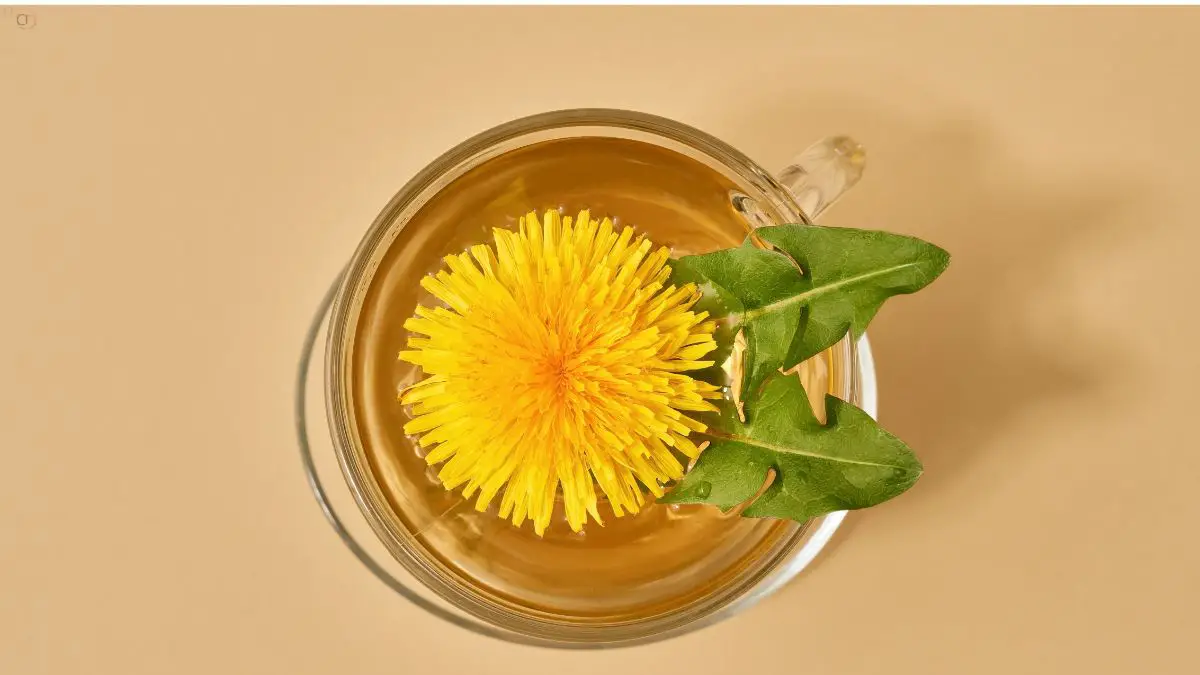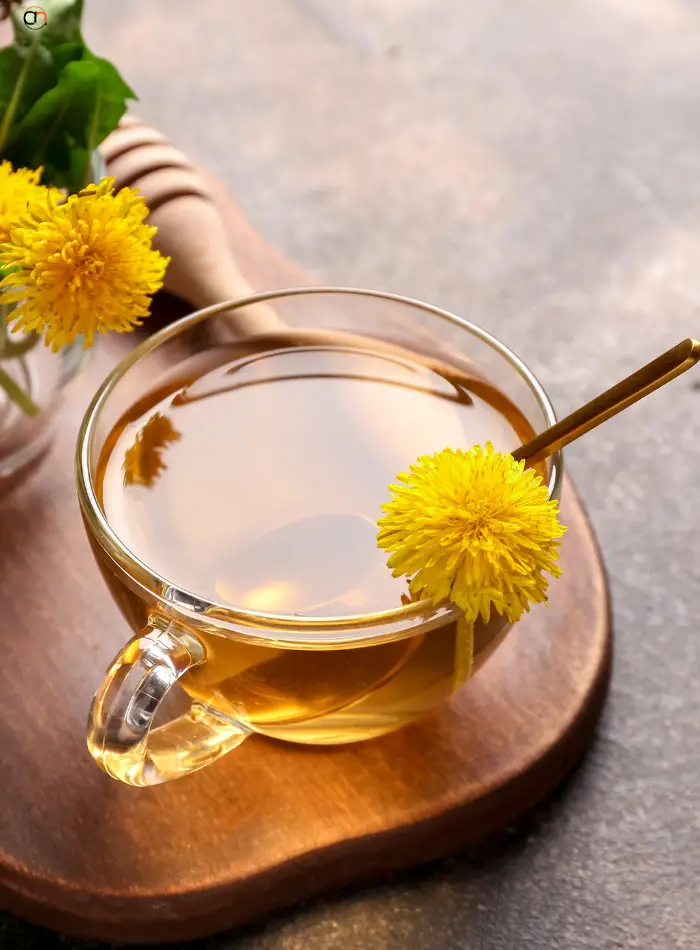How To Make Dandelion Tea From Fresh Leaves

Dandelion tea, made from the fresh leaves of the dandelion plant, is a flavorful and health-boosting herbal drink.
Often considered a weed, dandelion is packed with beneficial nutrients and medicinal properties.
Making tea from fresh dandelion leaves is easy and allows you to enjoy its natural, earthy taste while reaping the benefits for digestion, detoxification, and liver health.
Get how to make dandelion tea from fresh leaves, so you can experience its refreshing and healing qualities firsthand.
Why Choose Fresh Dandelion Leaves for Tea?
Fresh dandelion leaves are an excellent choice for making tea because they offer superior flavor and more potent health benefits compared to dried leaves. Here are a few reasons why fresh dandelion leaves are ideal for your tea:
Rich in Nutrients: Fresh dandelion leaves are packed with essential vitamins like A, C, K, and several B vitamins, as well as minerals such as potassium, calcium, and iron. These nutrients are more abundant in fresh leaves, giving your tea an added nutritional boost.
Better Taste: The flavor of fresh dandelion leaves is milder and more vibrant than dried ones. Their natural, slightly bitter taste provides a refreshing and earthy base for your tea.
More Antioxidants: Fresh leaves contain higher levels of antioxidants, which help protect the body from free radicals and support overall health. This makes fresh dandelion tea a powerful, rejuvenating drink.
Enhanced Detox Benefits: Known for their detoxifying effects, fresh dandelion leaves are particularly beneficial for liver and kidney health. Using fresh leaves ensures you’re getting the full effect of their cleansing properties.
Natural and Chemical-Free: Harvesting fresh dandelion leaves from your garden or a pesticide-free area means you’re consuming a tea free from chemicals and additives, making it a healthier and more natural option.
Choosing fresh dandelion leaves for tea means you’re enjoying a more flavorful, nutrient-dense, and health-boosting drink that maximizes the benefits of this incredible plant.
How to make dandelion tea from fresh leaves:
Making dandelion tea from fresh leaves is a straightforward and rewarding process. Follow these easy steps to create a flavorful and health-boosting cup of tea:
Step 1: Harvest Fresh Dandelion Leaves
Pick the right leaves: Choose vibrant, green dandelion leaves from a pesticide-free area or your own garden. Avoid yellowed or damaged leaves.
Harvest gently: Use clean hands or scissors to carefully pick about 8–10 leaves for one cup of tea.
Step 2: Clean the Leaves
Rinse the leaves under cool water to remove any dirt or debris. You can also soak them in a bowl of water for a few minutes to ensure they are thoroughly clean.
Step 3: Prepare the Leaves
Bruise the leaves: Gently crush or tear the leaves to release their natural oils and flavors. You can also chop them into smaller pieces if preferred.
Step 4: Boil Water
Bring 1–1.5 cups of water to a boil for each cup of tea you’re making.
Step 5: Steep the Leaves
Place the prepared dandelion leaves in a teapot or cup. Pour the hot water over the leaves and cover the container to trap the steam.
Let the leaves steep for 5–10 minutes, depending on how strong you want the flavor.
Step 6: Strain the Tea
After steeping, strain the tea to remove the leaves. You can use a fine mesh strainer or cheesecloth for this step.
Step 7: Add Optional Flavorings
If desired, sweeten your tea with honey, or add a slice of lemon for a tangy twist. You can also try adding ginger or mint for extra flavor.
Step 8: Serve and Enjoy
Pour your tea into a cup and enjoy it warm. For a refreshing twist, you can chill it and serve over ice.
Making dandelion tea from fresh leaves is a simple way to enjoy the plant’s natural detoxifying and digestive benefits. With minimal effort, you can enjoy a nourishing cup of homemade tea that’s both refreshing and good for your health.
Tips for the Best:
To make the most delicious and health-boosting dandelion tea, here are some useful tips to enhance both the flavor and the benefits:
Choose Fresh, Young Leaves: For the best flavor and maximum nutrients, select fresh, young dandelion leaves. Older leaves can be more bitter, so aim for tender, vibrant greens that are harvested in spring or early summer.
Mind the Steeping Time: Steep the dandelion leaves for 5–10 minutes. A shorter steep time will give you a milder tea, while a longer steep will result in a stronger, more robust flavor. Adjust the steeping time to suit your taste.
Customize the Flavor: Dandelion tea has a naturally earthy and slightly bitter flavor. To balance this, add a bit of honey or a slice of lemon for sweetness and zest. You can also experiment with adding ginger or mint to enhance the taste.
Use More Than Just the Leaves: For a richer, more complex tea, try using other parts of the dandelion plant, such as the roots and flowers. Roasting the roots or steeping the flowers will add additional flavor and health benefits.
Store Leftovers Properly: If you brew more tea than you can drink, store any leftovers in the fridge for up to 2 days. You can also enjoy it cold as an iced tea by refrigerating it after brewing.
Make It Iced: Dandelion tea is also delicious when served cold. Once brewed, let it cool and pour over ice for a refreshing, healthy beverage, especially in warm weather.
Avoid Overbrewing: Oversteeping can make the tea too bitter. Stick to the recommended steeping time and taste along the way to find the perfect balance for your preference.
With these tips, you’ll be able to make a flavorful, nutrient-packed cup of dandelion tea every time. Enjoy the detoxifying and digestive benefits while savoring its refreshing taste!
Health Benefits of Dandelion Tea:
Dandelion tea, made from the leaves, roots, and flowers of the dandelion plant, offers a variety of health benefits. Known for its natural healing properties, this herbal tea can support your overall well-being in several ways:
Improves Digestion: Dandelion tea can promote healthy digestion by stimulating bile production, which aids in the breakdown of fats. It also helps relieve bloating and constipation, making it a great choice for digestive support.
Promotes Liver Health: Known for its detoxifying qualities, dandelion tea supports liver function by helping eliminate toxins from the body. Its antioxidants protect the liver from damage, while its diuretic properties encourage the removal of waste and toxins.
Boosts Immune System: Packed with vitamin C and antioxidants, dandelion tea strengthens the immune system, helping your body fight off infections and reduce inflammation.
Enhances Skin Health: The anti-inflammatory and antioxidant compounds in dandelion tea can help improve skin conditions such as acne and eczema. Its diuretic effect helps flush out toxins, leading to clearer, healthier skin.
Supports Kidney Function: As a natural diuretic, dandelion tea helps promote kidney health by encouraging the removal of excess water and waste. This can help reduce bloating and support overall kidney function.
Helps with Weight Management: The diuretic properties of dandelion tea can reduce water retention and bloating, making you feel lighter. While not a weight-loss solution, it can support digestion and detoxification as part of a balanced health routine.
Reduces Inflammation: Dandelion tea has natural anti-inflammatory properties that may help reduce joint pain and swelling, offering relief for conditions like arthritis.
Supports Heart Health: Rich in potassium, dandelion tea helps regulate blood pressure and supports cardiovascular health. It may also aid in improving circulation and lowering cholesterol levels, promoting a healthy heart.
Read Next: How To Make Peppermint Tea
Helps Regulate Blood Sugar: Some studies suggest that dandelion may assist in regulating blood sugar levels, making it beneficial for people managing diabetes or those seeking to maintain balanced blood sugar.
Dandelion tea is a versatile herbal remedy with numerous health benefits. Its a natural and effective addition to a healthy lifestyle.
Last Call:
- Making dandelion tea from fresh leaves is an easy and enjoyable way to experience the numerous health benefits this plant offers.
- By following a few simple steps, you can brew a nourishing cup of tea that supports digestion, detoxifies the body, and boosts overall wellness.
- From harvesting fresh dandelion leaves to steeping them for the perfect infusion, this guide shows you how to prepare a delicious and beneficial herbal tea.
- If you’re aiming to enhance liver health or promote clear skin, dandelion tea is a fantastic addition to your daily routine.
Call to Action:
- Want to enjoy the health benefits of dandelion tea? Harvest some fresh leaves and follow our easy steps to make your own revitalizing brew.
- Start today and find how this simple tea can boost your well-being! Join us.
FAQs | how to make dandelion tea from fresh leaves
Q. can you make tea from dandelion leaves?
Yes! Dandelion leaves can be used to make a healthy and flavorful tea. They offer detoxifying benefits, support digestion, and are packed with nutrients like vitamins A, C, and K.
Q. How Do You Harvest Dandelion Leaves for Tea?
Harvest young, fresh dandelion leaves from a pesticide-free area or your garden. Choose vibrant, green leaves and avoid yellowed or damaged ones.
Q. What Are the Health Benefits of Dandelion Tea?
Dandelion tea helps with digestion, detoxifies the body, supports liver and kidney health, and is packed with antioxidants that boost immunity and improve skin health.
Q. How Do You Prepare Dandelion Leaves for Tea?
Simply rinse the leaves thoroughly, bruise or chop them to release their flavor, and steep them in hot water for 5–10 minutes. You can also add honey or lemon to enhance the taste.
Q. Can You Drink Dandelion Tea Every Day?
Yes, drinking dandelion tea daily is safe for most people. It can aid in digestion and detoxification. However, if you’re pregnant or taking certain medications, it’s best to consult a healthcare professional before consuming it regularly.






